../../../..//2008/03/20/the-fcc-banned-apartment-buildings/
The FCC banned apartment buildings from signing exclusive deals with phone operators, allowing tenants to exercise consumer choice. [NYT]
Thanks for visiting Consumerist.com. As of October 2017, Consumerist is no longer producing new content, but feel free to browse through our archives. Here you can find 12 years worth of articles on everything from how to avoid dodgy scams to writing an effective complaint letter. Check out some of our greatest hits below, explore the categories listed on the left-hand side of the page, or head to CR.org for ratings, reviews, and consumer news.
../../../..//2008/03/20/the-fcc-banned-apartment-buildings/
The FCC banned apartment buildings from signing exclusive deals with phone operators, allowing tenants to exercise consumer choice. [NYT]
../../../..//2008/03/19/the-great-wireless-auction-raised/
The Great Wireless Auction raised $19 billion dollars for the U.S. Government. According to Wired, they’re going to use it to buy converter boxes for people who don’t have digital tvs.

Comcast is now claiming that the FCC “has no legal power to stop the cable giant from engaging in what it calls ‘network management practices’ (critics call it peer-to-peer traffic blocking),” reports Ars Technica. In an amazing display of spin, Comcast writes that letting the marketplace “maximize consumer welfare” has been “enormously successful” as proven by the “Comcast customer experience”—seriously, we’re not making up these phrases. On a less humorous note, the filing in which Comcast makes these claims also seems to imply that it will sue the FCC if it tries to enforce any changes on how Comcast blocks P2P traffic.

The Government Accountability Office (GAO) released a new report yesterday that says that while the FCC processes about 95% of the complaints that come in, it takes some sort of enforcement action in only about 9% of them. “The GAO said it was unable to determine why the [other] investigations were closed without action because ‘FCC does not systematically collect these data.'” The FCC uses five separate databases and “about 46,000 paper files” to track complaints, and the GAO said “made it difficult to get answers to basic questions like how long it takes the agency to close an investigation and the total dollar amount it assesses in fines.”
../../../..//2008/02/19/in-response-to-consumer-backlash/
In response to consumer backlash, Verizon has decided to make it so alarms on its new phones don’t go off on its phones when you dial 911. This is so if you hide and call 911 when a prowler breaks in, you don’t give them a handy homing signal. [KOMO]

The complaint states that in violation of FCC rules, Verizon used its knowledge of switching customers — through requests to have their phone numbers moved or “ported” to the new provider — to ply them with “price incentives and gift cards” to stay with Verizon.
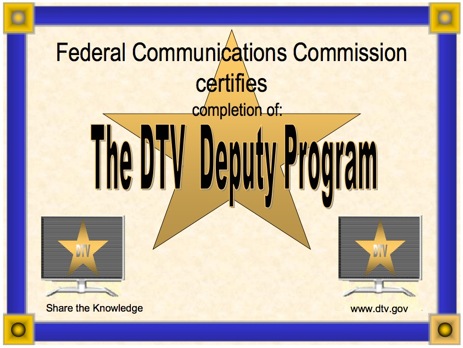
Howdy there partner, are you one of them DTV Deputies? No? The FCC thinks it’s high time you take the transition to digital television into your own hands. Because why pay for test trials in select communities when you can use early-90’s sound effects and cutting edge graphics to bait consumers into studying for a 13-question quiz?

Analysts are saying that Google is probably out of the running for the “C Block” of wireless spectrum that it had been bidding on.

The New York Times is reporting that the auction for the C-block of wireless spectrum (Read: the Google part) has may have been won by someone… but we don’t know who. Oh, the suspense!

Consumer Reports tells us that according to a survey they commissioned, consumers have absolutely no f@#$@%$ clue what the heck is going on with the digital TV conversion.

Bidding for the national franchise in the C block started at $1.037 billion in the morning and was raised to $1.245 billion in the afternoon. The reserve price for the national C block is $4.6 billion. (Google has said it will bid at least $4.6 billion for this block, but there is no requirement that it place a bid in that amount at first.)

If you’re like most people, you look at your “basic” cable line-up and think: “Why do I have all these stupid channels? Wouldn’t it be cheaper if I could just subscribe to the ones I actually like?”

Diane Keaton, while appearing live on “Good Morning America,” told Diane Sawyer that she’s admired her looks, particularly her lips, saying “that if she had lips like that she wouldn’t have had to work on her ‘fucking personality’ and would be married by now.” Obviously, Diane Keaton is awesome, but FCC chairman Kevin Martin is notoriously fond of attempting to punish stations that allow free spirited celebrities to slip in a few “shits” and “fucks” into their live television appearances.
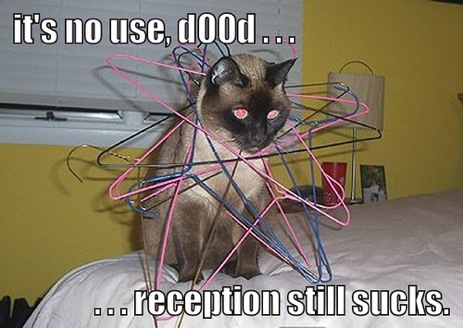
The federal government continues to bungle the transition to digital television, this time by making it difficult for consumers to redeem subsidy coupons for DTV converter boxes.
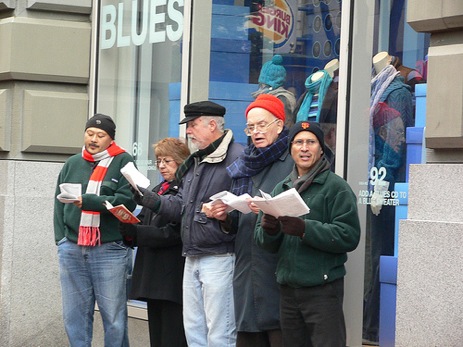
Meet The Singing Regulators. Regular FCC employees by day, these mellifluous regulators spend their nights performing humorous sendups inspired by the Commission’s work. Their latest song pokes fun at the FCC‘s utter failure to prepare the nation for the planned February 2009 transition to digital television.

Today, in an attempt to anger fans of both regulation and deregulation, the FCC approved two new rules. The first one restricts cable companies to owning no more than 30% of a market; the second one “gives owners of newspapers more leeway to buy radio and television stations in the largest cities.” One nice thing about the first rule is that Comcast can’t buy any more cable companies. One bad thing about the second one is that it will likely mean that Rupert Murdoch will win “permanent waivers to control two television stations in New York, as well as The New York Post and The Wall Street Journal.”
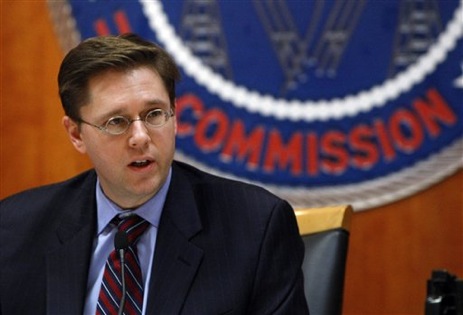
The Federal Communications Commission just approved Chairman Kevin Martin’s plan to shred 32-year-old rules that block media conglomerates from controlling both a newspaper and a broadcast station in the same market. The spectacled Chairman won on 3-2 party line vote, having failed to lure either Democratic commissioner with last-minute changes that will prevent the Commission from approving mergers in small media outlets that host profitable papers.
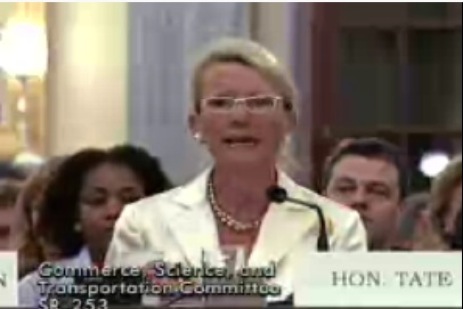
Join us at 10 a.m. for the FCC’s showdown with the Senate Commerce Committee. The hearing comes one day after Democratic Commissioners Jonathan Adelstein and Michael Copps pilloried Chairman Kevin Martin’s plan to allow one company to control a newspaper and television or radio station in the same city as: “a mish-mash of half-baked ideas.”
![]()
Part of ![]()
Founded in 2005, Consumerist® is an independent source of consumer news and information published by Consumer Reports.
